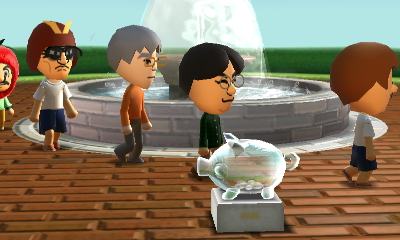Lost at sea.
Tomodachi Life earned the ire of the gay community when a glitch in the original Japanese release allowing same-sex couples to be wed in-game was removed from the American version. While this harmed Nintendo’s rep as a forward-thinking company with a mind for inclusivity, especially one with a history spanning over 100 years and plenty of playable princesses in its games, this new Nintendo 3DS title shouldn’t have eliminated that glitch. It should have kept it and made it a feature.
“Gay” used to mean jovial, but its use in modern times has resulted in some hurt feelings. For instance, one day in Junior High School my gym class divided into groups of four for basketball with boy-girl pairs facing off on the numerous concrete courts next to our gym. My male opponent was more athletic than I and made it known by shouting loudly that every basket he sank represented another hot blast of sperm “in my eye.” The girls giggled, perhaps awkwardly, but I was silent. I didn’t speak up for my own heterosexuality because it would never have changed his joyously pornographic description of schoolyard machismo dominance. My perception of the boundaries around homosexuality changed that day so it’s unfortunate that Tomodachi Life defines life and friendship in hollow terms.
The nearest comparative you can draw between Tomodachi Life and the rest of the Nintendo 3DS library is in last summer’s Animal Crossing: New Leaf, another life simulator about meeting friends, making new ones, and ultimately running a paradise or running it into the ground. Tomodachi Life presents a lot of the same mechanics with different shops and locations for events, albeit with less of a dependency on the system clock. Where Animal Crossing let you place bridges and decorations around town while styling your own home and inviting others to visit, Tomodachi Life features an island where much is set in stone.
As you welcome new guests and outfit them with clothing, decorate their apartments, or give them food to eat, you’ll unlock an observation tower, a park, a photo studio, a compatibility tester, and more. First, you’ve got to bring some new Miis to your central Mii Apartments, a three-story building with 24 rooms for your friends or Miis you make (and believe me, you’ll probably wind up making a few Nintendo-themed Miis to interact with). My first neighbor was Satoru Iwata, while Mario and Luigi, Peach and Daisy, Captain Falcon, and even Princess Zelda soon followed with their own sparse living spaces. Interacting with each Mii reveals problems they might have or allows you to play a quick game like guessing whose face has been pixelated or which foods have combined to make a shadow.
You’ll get bored immediately if your apartment building has more vacancies than occupants. Each Mii has a silly robotic voice that you can alter when you import them to the island, but listening to these digital characters talk will no doubt melt the brains of some more accustomed to immediate actions and mechanics. That said, encouraging Miis to form relationships or dressing, say, Captain Falcon in a folded paper hat will make you smile if only for the blindly cheerful presentation.
Aside from marriages and “sweethearts” in Tomodachi Life, everything feels extremely lighthearted and carefree as if sexuality had vanished from this odd patch of ocean altogether. The game is full of bright colors and foolishly simple commentaries on the daily lives of men and women. A male Mii will complain about what he’s wearing just as often as a female Mii, and neither will let you win every mini-game they invite you to play. Visiting the fountain once a day gets every citizen on the island to line up and drop change into a glass piggy bank, generating a fair amount of revenue which you can spend on food and hats or which you can horde for some of the more expensive interior decorations. Nothing about Tomodachi Life is gay in the pejorative sense, but everything carries a shine of benevolence that really does beg the question: Why can’t two guys or two girls get together in this game?
Sometime between the weenie roast and snapping a group photo at the studio, I realized that the answer to the LGBTQ community’s question gets ignored like the rest of the conflicts that pervade our daily lives. If only I could pay rent for myself and my entire apartment complex with daily donations at the management office. Instead, I have to write about stupidly violent video games and let my neighbor worry about his own troubles. I feel bad every time he says my name because I’ve forgotten his, but Tomodachi Life ensures you never forget which Mii character you’re looking at. As much as I’d want to live in this world, more often than not I found myself like the little Yu Narukami I created pictured above digging hopelessly in the sand.
You could even make the argument that Tomodachi Life further simplifies the Animal Crossing mechanics that many complain about for either taking too long or not paying off enough. Shops, neighbor interactions, and flying to the other side of the island require nothing more than a tap of the touchscreen, but that also makes the experience feel a little disengaged. Rather than admiring flowers on your way to the beach, you watch loading screens and might leave disappointed by how little is actually happening in any given part of town.
Tomodachi Life paints the Animal Crossing zen garden in neon colors before letting you slap a sombrero on it. Everything is almost unequivocally cheery which works on the level that many gamers probably crave from their handhelds on the subway or on a daily-play basis. For example, LGBTQ community members who hoped to bring their friends and their lives into this world will quickly realize that that was never Nintendo's intention which only created an entertaining fish tank for people with too much time on their hands.
Taken that way, Tomodachi Life succeeds on multiple levels. I love carrying my Nintendo 3DS around everywhere I go, especially when I’m traveling. I took Tomodachi Life on vacation last week and it was the perfect time-waster before heading to the beach or when I realized I forgot a book I’ve been meaning to read. I could spend over two hours poking at my Mii characters hoping they’d present a new problem or I could switch to the game when I got bored with another title and play for less than 10 minutes.
The difference between Animal Crossing and Tomodachi Life is not unlike the difference between elementary school and high school. In elementary school, the one boy everyone knew was gay was just a stranger to me. I thought he was cool because he got to hang out with all the pretty girls I had crushes on. The straight kids engaged in confused mock-marriage ceremonies during lunch. That’s not unlike Animal Crossing’s online interactions where you’re not allowed to move into another person’s town to play house, but you can stand around the big tree and tap innocent messages to each other online.
In junior high and high school, sexuality could be wielded like a weapon to intimidate those of the same sex or do battle with those of the opposite. Tomodachi Life simply doesn’t care. That feels insulting to some, but in the end the game seems just as confused and shallow as a kid shouting about facials during gym class or crying alone in front of a mirror, struggling over which potential prom date to say yes to. Rather than sit in this emotional distress, the Miis on your island will ask you to buy them food or they'll sing a song for you. Those schoolyard dramas achieve profound effects on everyone in life, gay or straight, but they're also absent from the game's perception of our world and its playful take on reality.
Tomodachi Life does its best to cut through a lot of society's hateful garbage to produce an incredible island paradise of distraction and more often than not succeeds, but not without stumbling all over itself, revealing too many embarrassing inner thoughts. Just like that kid in gym class, it’s possible to cross a line trying to prove a point. There’s no progress in Tomodachi Life without you and maybe that’s to the game’s advantage. It puts no pressure on you to keep playing if you really hate the game, but revisiting your island paradise later won’t leave you feeling guilty since you don’t have to worry about picking a bunch of weeds.
Code provided by publisher. Exclusive to Nintendo 3DS.
-
Short gameplay loops for daily handheld users
-
Faster pace than Animal Crossing
-
Not as relaxing or as deep
-
Doesn't allow for as much player choice
-
Mii customization and personalities
Tomodachi Life
-
Tomodachi Life #1
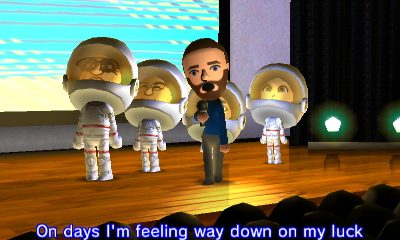
-
Tomodachi Life #2
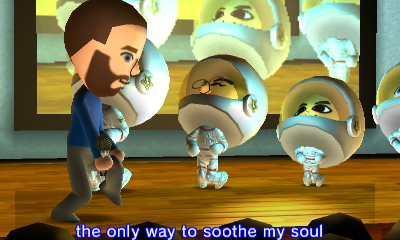
-
Tomodachi Life #3
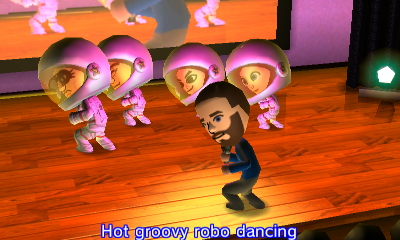
-
Tomodachi Life #4
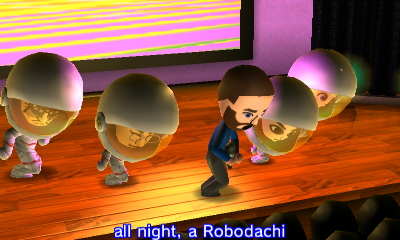
-
Tomodachi Life #5
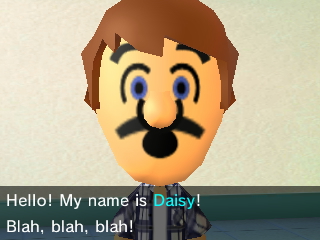
-
Tomodachi Life #6
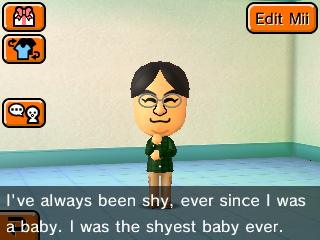
-
Tomodachi Life #7
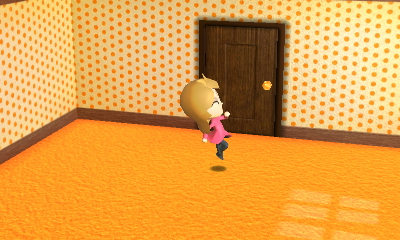
-
Tomodachi Life #8
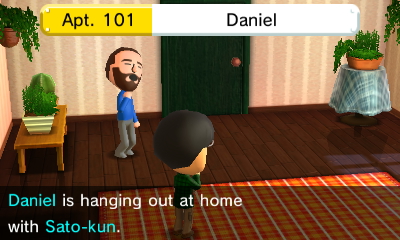
-
Tomodachi Life #9
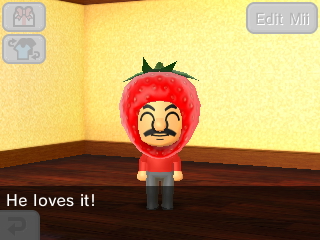
-
Tomodachi Life #10
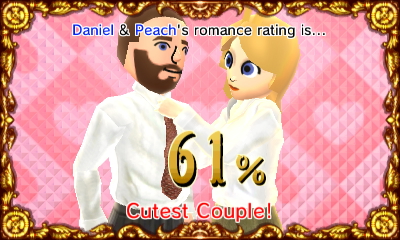
-
Tomodachi Life #11
